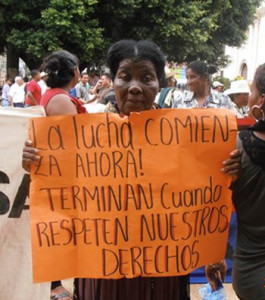By Kris Abrams
|
|
The indigenous Miskito people live amongst lush rainforests along the Caribbean Coast in Honduras. But despite treaties dating back to the 1850s that recognize their rights, cattle ranchers, palm oil companies, and others have been grabbing Miskito lands and cutting down their forests.
“We didn’t have any legal recourse,” said Cendela Lopez, who is the president and co-founder of the Organization of Indigenous Women of the Moskitia, a Global Greengrants grantee. “These were very powerful people. If we protested, our people would be killed.”
Despite the danger, in 2010, a coalition of ten independent indigenous federations known as Moskitia Asla Takanka (MASTA) (also a Global Greengrants grantee), organized hundreds of Miskito people to travel to the capitol city of Tegucigalpa and demonstrate in front of the presidential house of government. They demanded title to their land, and won an agreement, signed by the president himself, to work toward granting them land titles.
That promise came to fruition in 2013, when the Miskito won title to some 2,500 square miles, comprising 7 percent of all land in Honduras.
Norvin Goff, President of MASTA, explained why this victory matters to his people, and to the world: “The forest isn’t just about trees. And it isn’t just about climate change. The forest is our teacher. It keeps us healthy. It provides us with food, medicine, and education. We need the forests, and in these times, the forests need us. And the world needs the integrated vision and stewardship that indigenous people provide.”
Norvin Goff added: “Every form of support is important; Global Greengrants’ support came at an important time. It helped us to involve the community—from the local level all the way up to the national government, so the community could have a voice at the national level. Thank you on behalf of the Moskitia community.”

